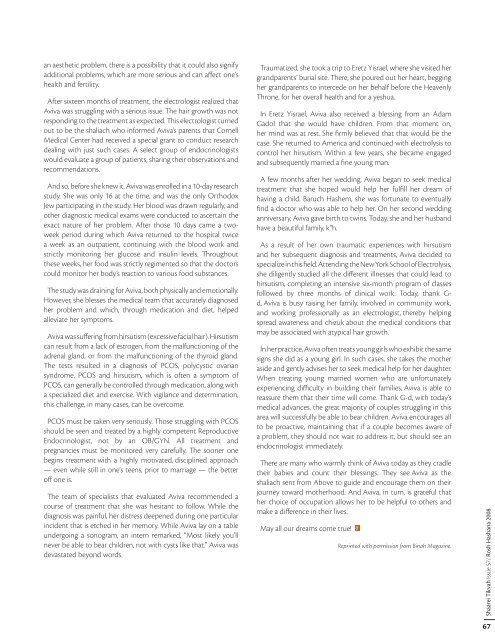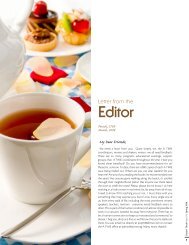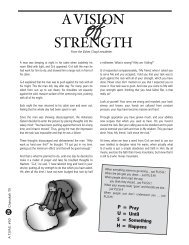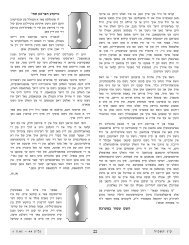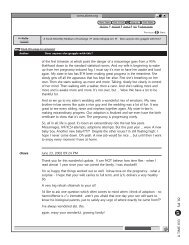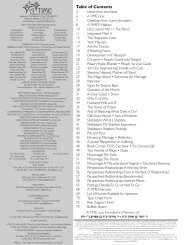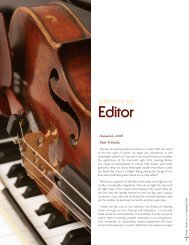Rosh Hashanah 5769/2008 - Jewish Infertility
Rosh Hashanah 5769/2008 - Jewish Infertility
Rosh Hashanah 5769/2008 - Jewish Infertility
You also want an ePaper? Increase the reach of your titles
YUMPU automatically turns print PDFs into web optimized ePapers that Google loves.
an aesthetic problem, there is a possibility that it could also signifyadditional problems, which are more serious and can affect one’shealth and fertility.After sixteen months of treatment, the electrologist realized thatAviva was struggling with a serious issue. The hair growth was notresponding to the treatment as expected. This electrologist turnedout to be the shaliach who informed Aviva’s parents that CornellMedical Center had received a special grant to conduct researchdealing with just such cases. A select group of endocrinologistswould evaluate a group of patients, sharing their observations andrecommendations.And so, before she knew it, Aviva was enrolled in a 10-day researchstudy. She was only 16 at the time, and was the only OrthodoxJew participating in the study. Her blood was drawn regularly, andother diagnostic medical exams were conducted to ascertain theexact nature of her problem. After those 10 days came a twoweekperiod during which Aviva returned to the hospital twicea week as an outpatient, continuing with the blood work andstrictly monitoring her glucose and insulin levels. Throughoutthese weeks, her food was strictly regimented so that the doctorscould monitor her body’s reaction to various food substances.The study was draining for Aviva, both physically and emotionally.However, she blesses the medical team that accurately diagnosedher problem and which, through medication and diet, helpedalleviate her symptoms.Aviva was suffering from hirsutism (excessive facial hair). Hirsutismcan result from a lack of estrogen, from the malfunctioning of theadrenal gland, or from the malfunctioning of the thyroid gland.The tests resulted in a diagnosis of PCOS, polycystic ovariansyndrome. PCOS and hirsutism, which is often a symptom ofPCOS, can generally be controlled through medication, along witha specialized diet and exercise. With vigilance and determination,this challenge, in many cases, can be overcome.PCOS must be taken very seriously. Those struggling with PCOSshould be seen and treated by a highly competent ReproductiveEndocrinologist, not by an OB/GYN. All treatment andpregnancies must be monitored very carefully. The sooner onebegins treatment with a highly motivated, disciplined approach— even while still in one's teens, prior to marriage — the betteroff one is.The team of specialists that evaluated Aviva recommended acourse of treatment that she was hesitant to follow. While thediagnosis was painful, her distress deepened during one particularincident that is etched in her memory. While Aviva lay on a tableundergoing a sonogram, an intern remarked, “Most likely you’llnever be able to bear children, not with cysts like that.” Aviva wasdevastated beyond words.Traumatized, she took a trip to Eretz Yisrael, where she visited hergrandparents’ burial site. There, she poured out her heart, beggingher grandparents to intercede on her behalf before the HeavenlyThrone, for her overall health and for a yeshua.In Eretz Yisrael, Aviva also received a blessing from an AdamGadol that she would have children. From that moment on,her mind was at rest. She firmly believed that that would be thecase. She returned to America and continued with electrolysis tocontrol her hirsutism. Within a few years, she became engagedand subsequently married a fine young man.A few months after her wedding, Aviva began to seek medicaltreatment that she hoped would help her fulfill her dream ofhaving a child. Baruch Hashem, she was fortunate to eventuallyfind a doctor who was able to help her. On her second weddinganniversary, Aviva gave birth to twins. Today, she and her husbandhave a beautiful family, k”h.As a result of her own traumatic experiences with hirsutismand her subsequent diagnosis and treatments, Aviva decided tospecialize in this field.AttendingtheNewYorkSchoolofElectrolysis,she diligently studied all the different illnesses that could lead tohirsutism, completing an intensive six-month program of classesfollowed by three months of clinical work. Today, thank G-d, Aviva is busy raising her family, involved in community work,and working professionally as an electrologist, thereby helpingspread awareness and chizuk about the medical conditions thatmay be associated with atypical hair growth.In her practice, Aviva often treats young girls who exhibit the samesigns she did as a young girl. In such cases, she takes the motheraside and gently advises her to seek medical help for her daughter.When treating young married women who are unfortunatelyexperiencing difficulty in building their families, Aviva is able toreassure them that their time will come. Thank G-d, with today’smedical advances, the great majority of couples struggling in thisarea will successfully be able to bear children. Aviva encourages allto be proactive, maintaining that if a couple becomes aware ofa problem, they should not wait to address it, but should see anendocrinologist immediately.There are many who warmly think of Aviva today as they cradletheir babies and count their blessings. They see Aviva as theshaliach sent from Above to guide and encourage them on theirjourney toward motherhood. And Aviva, in turn, is grateful thather choice of occupation allows her to be helpful to others andmake a difference in their lives.May all our dreams come true! STReprinted with permission from Binah Magazine.Shaarei Tikvah Issue 57/ <strong>Rosh</strong> Hashana <strong>2008</strong>67rosh hashana_magazine2.indd 6721/09/<strong>2008</strong> 7:08:43 PM


